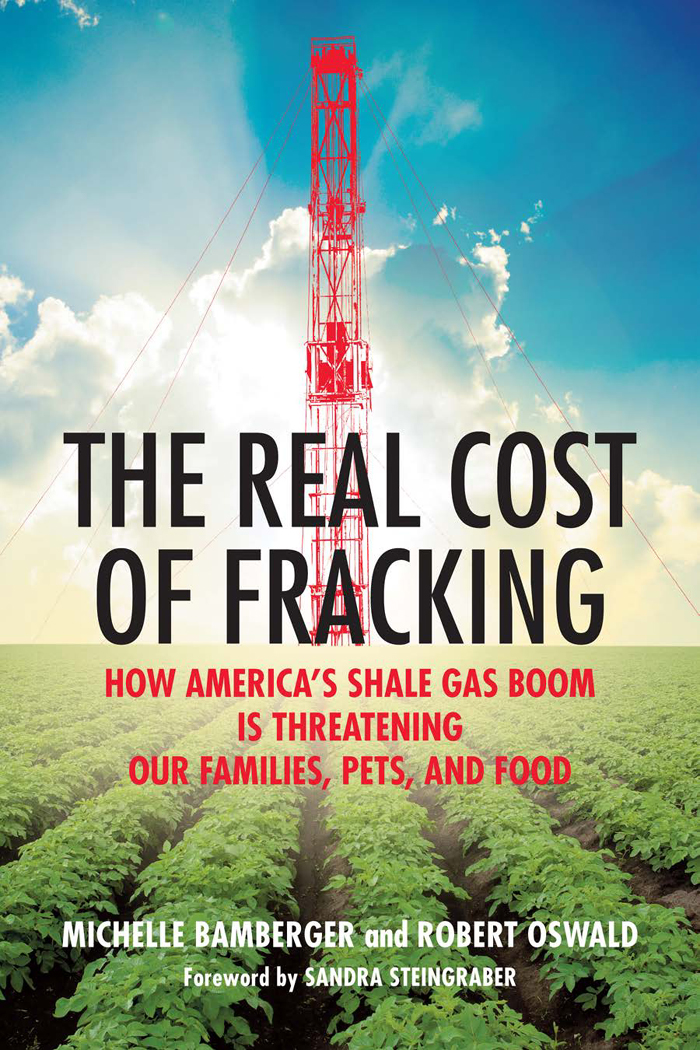
The Real Cost of Fracking
How America's Shale Gas Boom Is Threatening Our Families, Pets, and Food
چگونه رونق گاز شیل آمریکایی خانوادهها، حیوانات خانگی و مواد غذایی ما را تهدید میکند
کتاب های مرتبط
- اطلاعات
- نقد و بررسی
- دیدگاه کاربران
نقد و بررسی

June 23, 2014
Veterinarian Bamberger (Help! The Quick Guide to First Aid for Your Dog) and pharmacologist Oswald present case studies from Pennsylvania to support their assertion that processes involved in hydraulic fracturing have health consequences oil companies or regulatory agencies refuse to acknowledge. In case after case, the authors describe adults, children, pets, and livestock suffering symptoms of “shale gas syndrome,” which they link to contaminated water sources and poisoned air. As it stands, companies are neither required to test before drilling operations nor do they have to disclose the chemicals used in their operations. Physicians and residents who have accepted settlements are often legally prohibited from speaking about health problems linked to drilling. In 2005, Congress excluded “fracking” from the Safe Drinking Water Act, thus removing the EPA oversight of the industry, and the Pennsylvania Department of Environmental Protection has repeatedly failed to find in favor of the citizens, leaving those individuals to the mercy of the corporations. With the economic benefits of fracking in doubt and strong evidence for health and environmental risks, the authors urge subsidies for alternative energy development. This work should be a wake-up call to concerned citizens and policy makers alike.

Starred review from June 15, 2014
A primer on unconventional fossil fuel extraction, with convincing evidence as to its deleterious nature, from veterinarian Bamberger and Oswald (Molecular Medicine/Cornell Univ.).Two significant questions loom over this study: "[W]hat degree of risk and environmental degradation are acceptable to obtain [fossil fuel] energy? Who should be asked to sacrifice, and who should profit?" At issue here is the contested practice of fracking, the hydraulic shattering of shale to extract trapped energy through the administration of chemicals that are known to be carcinogenic and have mutation and endocrine disruptor issues. The authors are not only lucid writers on scientific topics-the appendix on gas drilling should be required reading on the subject-but also warm storytellers, despite the contentious subject matter. They believe the burden of proof should not rest on the victim but on the company wishing to deploy fracking. Since that is not the case, they took to the field to document instances of what appear to be serious air, water and soil pollution caused by the fracking process. The stories of people who have experienced what they believe will be fracking's poisonous legacy are poignant, as they often involve animals and children, often the proverbial canaries in the coal mine: "Because of their higher metabolic rates and immature neurological and detoxifying systems, children are at higher risk of developing adverse health effects from environmental hazards, including those from nearby industrial operations." However, the trail between fracking's spoils and health issues is often thwarted by the absence of testing evidence, which most owners do not conduct prior to drilling, typically due to its high cost. Still, the authors "believe that the sudden deaths of farm animals following exposure to hydraulic fracturing fluid provides a clear link between gas drilling operations and health impacts."In this cool, disarming and persuasive indictment of fracking's widespread negative consequences, the authors provide an important addition to an ongoing debate.
COPYRIGHT(2014) Kirkus Reviews, ALL RIGHTS RESERVED.

July 1, 2014
After learning that neighbors in their Upstate New York town had leased land to energy companies for gas drilling, veterinarian Bamberger and Oswald (molecular medicine, Cornell Univ.) began researching hydraulic fracturing, or fracking, and its effects on human and animal health. Reviewing government reports and scientific literature on the controversial practice, they discovered cases involving water, soil, and air contamination. Concerned about their findings, they interviewed families, mainly in Pennsylvania, who either had fracking wells on their property or lived near such structures. The interviewees recounted experiences involving companion animals that failed to reproduce after drinking contaminated well water, livestock that died after exposure to hydraulic fracking fluid, and human health problems including breathing issues and severe headaches. Readers should note, however, that fracking is a complicated process, and, absent exhaustive data, it is difficult to conclude that the presence of toxic materials in soil, water, and air are responsible for human and animal health problems. VERDICT Focusing more on the potential effects of fracking on humans and animals than Russell Gold's The Boom, this pragmatic, cautionary analysis is recommended for general readers.--Eva Lautemann, formerly with Georgia Perimeter Coll. Lib., Clarkston
Copyright 2014 Library Journal, LLC Used with permission.

























دیدگاه کاربران